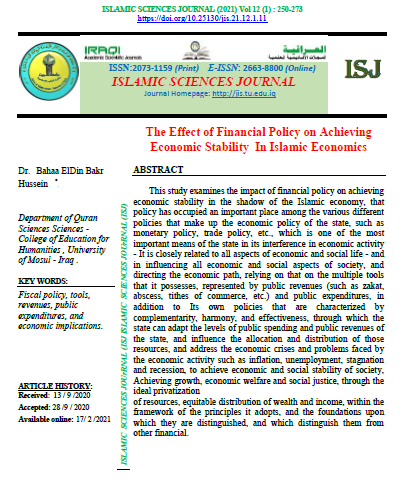The Effect of Financial Policy on Achieving Economic Stability In Islamic Economics
Main Article Content
Abstract
This study examines the impact of financial policy on achieving economic stability in the shadow of the Islamic economy, that policy has occupied an important place among the various different policies that make up the economic policy of the state, such as monetary policy, trade policy, etc., which is one of the most important means of the state in its interference in economic activity - It is closely related to all aspects of economic and social life - and in influencing all economic and social aspects of society, and directing the economic path, relying on that on the multiple tools that it possesses, represented by public revenues (such as zakat, abscess, tithes of commerce, etc.) and public expenditures, in addition to Its own policies that are characterized by complementarity, harmony, and effectiveness, through which the state can adapt the levels of public spending and public revenues of the state, and influence the allocation and distribution of those resources, and address the economic crises and problems faced by the economic activity such as inflation, unemployment, stagnation and recession, to achieve economic and social stability of society, Achieving growth, economic welfare and social justice, through the ideal privatization
of resources, equitable distribution of wealth and income, within the framework of the principles it adopts, and the foundations upon which they are distinguished, and which distinguish them from other financial.
Article Details

This work is licensed under a Creative Commons Attribution 4.0 International License.
COLLEGE OF ISLAMIC SCIENCES, TIKRIT UNIVERSITY. THIS IS AN OPEN ACCESS ARTICLE UNDER THE CC BY LICENSE http://creativecommons.org/licenses/by/4.0/

